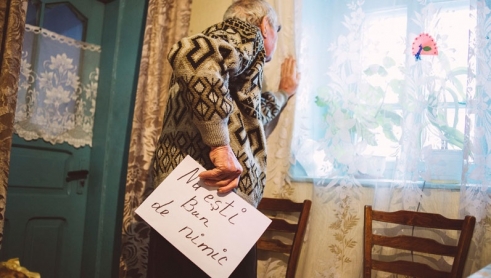By Ben Small
One in four (28.6%) of older people in Moldova have been victim of violence or abuse, according to a new study from HelpAge International and the National Centre for Demographic Research.
Breaking the silence: Elder abuse in the Republic of Moldova reveals that older people often know their abuser too, with a quarter of cases being perpetrated by a member of their family or someone close to them. This proximity led to a third of these cases of abuse being repeated, and serves as a deterrent to victims considering reporting it.

An older man from Moldova holds sign saying ‘you are good for nothing’
Abuse can manifest in many different ways, but it is psychological and emotional violence, including humiliation, insulting and intimidation, that the study found most prevalent (14% of incidences). This is followed by economic violence (11%), where money, property or possessions are stolen or spoiled, and physical violence (4%).
When the data is disaggregated by gender, the study reveals women are more likely to be victims of abuse – making up two-thirds of cases.
Negative perceptions of age permeate society in Moldova. Older people are stereotyped as weak and burdensome, which the study claims leads to mistreatment.
“I know an old woman who keeps hiding because her own daughter beats her. She slept on a bench in a park because she was afraid to go home. Her son-in-law does not have a job. They trick her pension out of her,” said one attendee of a focus group in the south-eastern Moldovan city of Causeni.
Discrimination occurs throughout the wider society too, with 17% of respondents reporting abuse from the community and public authorities. With medical staff, public transportation staff, social workers and even banks insulting, deceiving or neglecting older people.
“Everyone has equal rights, including the right to live with dignity, and this does not change with age,” said Tatiana Sorocan, Moldova Country Director at HelpAge International.
“However, this research shows that more than a quarter of older people in Moldova experience violence and abuse. We need to make sure that age-friendly services are developed and appropriate campaigns are run to raise awareness and stop discrimination and abuse happening in the future.”
How can elder abuse be stopped?
To tackle this level of elder abuse in Moldova, the report suggests that a positive attitude towards older people must be promoted, highlighting their social, economic and cultural value to society, as well as championing solidarity between generations.
Older people should be encouraged to participate in their local communities, and they should be made aware of their rights, giving them legal assistance when they need it.
As the report launched, HelpAge, officials from the Moldova government, experts on ageing and representatives of the World Bank and the United Nations Population Fund came together to discuss the issues afflicting Moldova’s older population and consider policy priorities.
Across Europe and Central Asia
Another reported entitled Golden Aging: Prospects for Healthy, Active and Prosperous Aging in Europe and Central Asia was simultaneously presented at the event, looking at the wider ageing trends throughout the region.
“Societies are ageing across Europe and central Asia, but individuals are not – it is a demographic trend driven by declining fertility rates rather than increased longevity,” said Johannes Koettl, the senior economist at the World Bank who presented the report.
He added that for countries to adapt to an ageing population, they must enable individuals to participate in the labour market for longer, which will ensure there is a more stable demographic balance between the working population and dependents.
Find out more:
- Download the report.
- Read about our work in Moldova.
